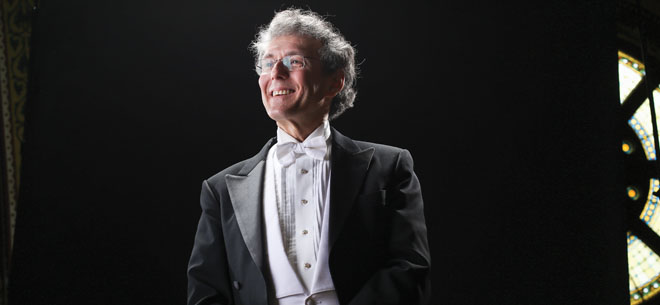
When Martin Pearlman steps onto a stage, the audience knows they’re in for a unique experience. Pearlman is a composer, conductor and the music director and founder of Boston Baroque, North America’s first period-instrument orchestra. He is also a man with serious musical vision.
In 1973 Pearlman had just returned from Amsterdam where he was studying harpsichord. Wanting to put his love for period instruments into practice, he started Boston Baroque (then called Banchetto Musicale) with only seven people.
The instruments span from about 1600 to the late 1700s. Although they look traditional, they work a little differently. “Everything is designed for a slightly more transparent sound,” says Pearlman. Take the trumpet, for example. A period trumpet doesn’t have finger valves to control the sound; the player has to make every note with their lips. “It takes a while to learn to play them,” says Pearlman. “You have to use your musical instincts.”
One of Boston Baroque’s most popular performances is its rendition of Handel’s Messiah. The piece has been associated with the holidays for many years and Boston Baroque’s spin on the composition is “iconic,” says Pearlman. “It’s a wonderful dramatic work by one of the greatest composers ever, and it feels different every time.” Pearlman never planned to perform Messiah annually, yet audiences request its return every holiday season.
In contrast, Pearlman’s own compositions are very contemporary and incorporate modern instruments. Most notably he adapted the James Joyce novel Finnegan’s Wake into a three-part opera. “I’m not an antiquarian,” Pearlman laughs. “Even the Boston Baroque music is very contemporary.”
The holidays are usually a peaceful, restful time, yet for Pearlman they’re the start of a very full musical season. Apart from the Messiah, Boston Baroque performs a New Year’s concert that has become very popular. This year Pearlman has chosen a humorous piece by Cimarosa, Il maestro di capella, or The Conductor. It follows the story of a flustered conductor trying to rehearse with a group of underprepared performers. During the piece, the theoretical conductor has to perform many of the parts himself to teach the rest of the orchestra.
Pearlman operates in a similar way. Sometimes he’s conducting; sometimes he’s playing the harpsichord in time with the orchestra, participating fully in all aspects of the performance. “This is how Handel performed his music as well,” says Pearlman. “We’re up and down the whole show, totally immersed in the music.”


